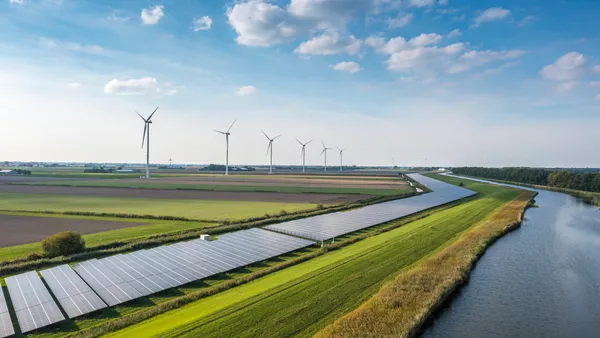Dive Brief:
-
Of 19 major investor-owned utilities in the U.S., ten have publicly announced decarbonization goals. But only one of those ten has tied the completion of those goals to executive compensation, according to a Sept. 22 report by the Energy and Policy Institute.
-
Xcel Energy, the single company included in the report to tie executive compensation to performance on emissions goals, established the incentive as early as 2014 — four years before Xcel announced its zero carbon goal in December 2018.
-
While other companies may have similar compensation plans in the works, establishing an incentive that actually accelerates decarbonization can be complicated, according to shareholder advocacy group As You Sow.
Dive Insight:
Executive incentives are one way for companies to put their money where their mouths are with respect to corporate goals. But when it comes to climate change and decarbonization, adopting an effective incentive package can prove challenging, shareholder advocates say.
For utilities that aim to reduce emissions and achieve decarbonization, building incentives for those goals into their executive compensation packages should be a baseline requirement, according to Kelly Roache, a research and communications specialist at the Energy and Policy Institute.
"At the very minimum, if these companies are serious about decarbonization, they should align leadership incentives toward that goal," she said. "If they're not doing that, I think it opens a question about if they have a serious plan to executive on those goals."
Roache offered Xcel's incentive program as a case study — since introducing a carbon incentive in 2014, the emissions reduction required to receive a 100% payout has increased from 21% to 47%, suggesting that the incentives "have been both profitable for shareholders and beneficial for company leaders," Roache said. According to the Energy and Policy Institute analysis, the carbon emissions incentive accounts for just under a quarter of Xcel CEO and Chairman Ben Fowke's total compensation package.
With large shareholders increasingly demanding that firms provide some means of accountability with respect to corporate carbon targets, many utilities have begun talking about adopting similar incentives, looking to Xcel as a possible model, according to Lila Holzman, energy program manager at As You Sow. But putting such incentives into place can be more complicated than it may first appear, she said.
"It's challenging to get a good package," Holzman said. "We want to see incentives for CEOs to take action now, because if they've set a target for 2050, they might not be there by 2050. That's part of the challenge — what kind of incentives can give that assurance?"
In general, an effective incentive needs to be something measurable, and it needs to be tied to something the recipient of the incentive can actually control, according to Rosanna Landis Weaver, executive compensation program manager for As You Sow. With respect to utility decarbonization, she said she also looks for incentives that reward actions beyond business as usual. Otherwise, Weaver said, the incentive only serves to inflate CEO compensation without producing meaningful change.
Holzman also joined Roache in criticizing utilities that provide incentives for building new renewable resources, rather than focusing on emissions.
"It's possible that the company could continue to add new renewable resources," she said, "but continue to use their coal and build new gas."
Climate incentives can also be overshadowed by other incentives that could conflict with decarbonization goals, Weaver added. For example, a climate incentive may not prove effective if reducing emissions is tied to a 2% bonus, but cutting costs yields an 80% bonus.
This isn't to say executive compensation isn't important to combating climate change, according to Weaver. But just having an incentive, she said, doesn't ensure meaningful progress will take place either.
"We need to make sure that [the adoption of clean energy] is accelerated and that it does translate to moving away from fossil fuels faster," she said. "However, it's important to look at the whole package and make sure it is all focused on the long term."














